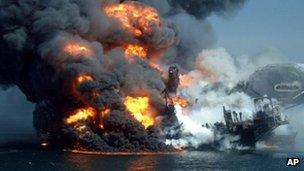BP 'egregious' for drilling Macondo oil spill well
- Published

BP has already agreed huge payouts in the wake of the spill
BP has been accused of disregarding evidence during drilling that the Macondo oil well was unstable.
Expert witness Alan Huffman told the third day of the New Orleans trial over the Gulf of Mexico spill that BP should have heeded a "kick" in the well.
"It is truly egregious to drill that extra 100 feet, knowing you could lose the well in the process," he said.
BP accepts partial responsibility for the oil spill, but claims other firms at the trial share the blame and costs.
These include Transocean, the operator of the Deepwater Horizon rig being used, and Halliburton, who provided cement for lining the Macondo well.
Both firms have sought to apportion all the blame for the 2010 oil spill on BP.
The Macondo explosion killed 11 men and released an estimated four million barrels of oil into the Gulf over 84 days. Since the leak was plugged, the debate over who was responsible has raged on.
If BP loses, it could face a huge fine, despite having already agreed in 2012 to pay $4.5bn (£2.9bn) to settle criminal charges.
An unfavourable trial verdict could see the firm liable for the biggest civil fine in history, of up to $17.6bn.
Oil analyst Nick McGregor: Brand BP is not going to redeem itself until after a final settlement
It has also paid out $7.8bn in a settlement with people and businesses affected.
'Tremendous pressure'
Mr Huffman, chief technology officer for Fusion Petroleum Technologies Inc, was called to the trial by the plaintiffs.
The geophysicist, who has worked for Conoco and Exxon, said the kick during drilling in 2009 - a year before the spill - was evidence of gas or oil intrusion.
He said it should have made plain to BP employees that the pressure under the well was unstable, making the well "dangerous and fragile", and that drilling should have stopped immediately.
The lawyers bringing the action on behalf of the US Department of Justice and the various US states affected by the spill have accused BP of putting profits ahead of safety.
Earlier in the day, the court heard recorded testimony from former chief executive Tony Hayward, and from the former head of drilling operations, Kevin Lacy, who appeared to contradict one another.
In a 20-minute excerpt from hours of examination carried out in 2011, Mr Hayward insisted that cost-cutting at BP had not affected its drilling operations.
Mr Lacy, in contrast, said that $250m-300m had been cut from his budget in 2008-09, while production increased by over 50%.
"I was never given a directive to cut corners or deliver something not safely, but there was tremendous pressure on costs," he said.
Mr Lacy resigned from BP a few months before the spill, because of his concerns about safety.
The day began with another BP executive, exploration and production head Lamar McKay, who finished his live testimony, repeating the line he gave on Tuesday that others shared the blame with BP.
"We've agreed that we're part of the responsibility for this tragic accident," he said. "We've apologised for that."
Cross-examining Mr McKay, lawyers acting for Transocean got him to agree that Deepwater Horizon had been "a very safe operating rig" but only "up until the accident".
Halliburton's lawyer produced an email sent by BP engineer Brian Morel to colleagues on the day of the well blowout that said: "Just wanted to let you know that the Halliburton cement team they sent out did a great job."
- Published27 February 2013
- Published27 February 2013
- Published25 February 2013
- Published25 February 2013
- Published15 November 2012